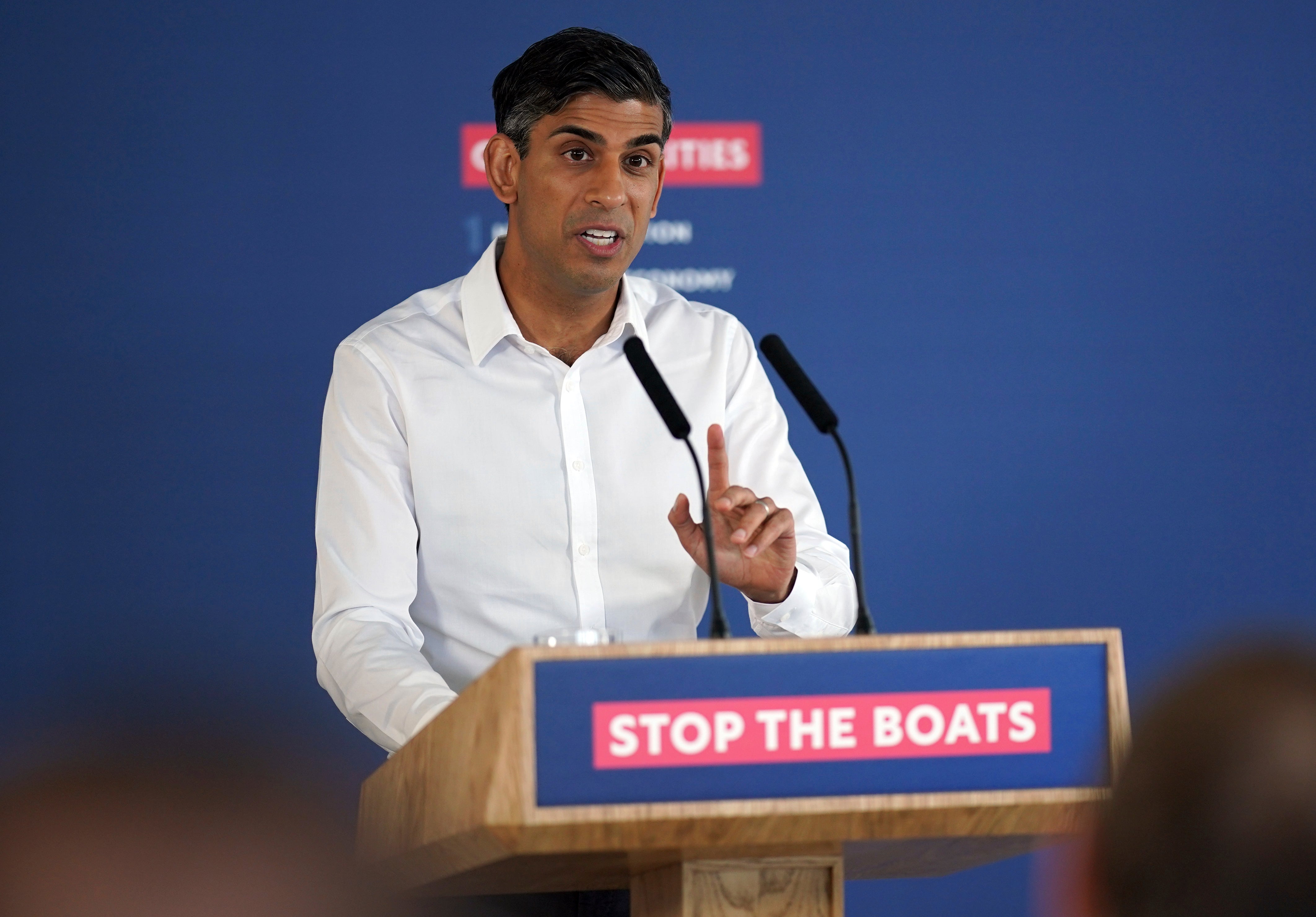‘Stop the boasts’: Rishi Sunak risks overpromising and underdelivering
Editorial: Even if the PM did ‘stop the boats’, there would still be around 160,000 people awaiting an initial decision

The prime minister may have been unwise to make such a bold and bald claim that he will “stop the boats” by the end of 2023, but the latest migration trends suggest that he is at least making some progress in the most problematic of the five priorities he has set himself for this year.
They also point to some of the ways in which he might come closer to reaching what has always been an overambitious target (even if it is not taken literally). At a time when he finds himself in open warfare with Boris Johnson over the Covid-19 inquiry, his personal ratings have been slipping a little, so some better news on policy “delivery” is no doubt very welcome.
On his own terms, then, Rishi Sunak can take some satisfaction in the news that the trend in boat crossings is firmly down in the first few months of the year, by around a fifth. Over such a long period as five months, weather conditions cannot have played such a major part in slowing the flow, and it does seem that specific measures have yielded results.
There’s no reason to doubt Mr Sunak’s claim that the French authorities stopped some 33,000 people crossing the Channel last year, up 40 per cent on 2021, and that interceptions this year by the French are “up considerably”.
Admittedly, this has been achieved at considerable cost to the British taxpayer, but it cannot be said that the French aren’t putting any effort into fulfilling their side of the bargain. Mr Sunak’s personal rapprochement with Emmanuel Macron may have helped to motivate those patrolling the north French coast.
Mr Sunak’s returns agreement with the Albanian government has produced even more dramatic results – the number of Albanians arriving by small boat is down by 90 per cent. In the past, nearly a third of the people who arrived on small boats came from Albania, so the new approach has made a substantial difference.
These factors point to some fundamental truths about an effective policy. The cooperation with France has been, and always will be, essential in dealing fairly but effectively with the flow of asylum seekers.
Without that cooperation – remembering the state of near cold war that existed while Mr Johnson and Liz Truss were in charge – any British policy is almost doomed to failure. As Mr Sunak said at the weekend conference of the European Political Community (EPC) in Moldova, the refugee issue is a European one if not a global one, and demands international coordination.
At the EPC meeting, Turkey and Bulgaria agreed to share intelligence with the UK, while the EU is still working, albeit with some resistance from Poland and Hungary, towards an agreement between its 27 members on sharing the task of settling genuine refugees.
Arduous and slow as such pancontinental efforts are, they will yield far better results than the lurid rhetoric about “invaders” and suchlike that spurts so freely from the home secretary, Suella Braverman.
The reduction in the number of Albanians also demonstrates the value of returns agreements. The Albanian government’s cooperation was essential to this success, and other countries may well follow suit. Again, this kind of detailed, pragmatic work between nations represents a durable, sustainable route to ensuring a just policy.
Even on the basis of its modest scale, leaving aside its violation of international human rights obligations, the Rwanda refugee deportation scheme looks unlikely to be any kind of substitute for a series of bilateral returns agreements. So far there is no evidence that it has constituted any kind of deterrent.
All that said, and with due credit to Mr Sunak for his steady application, British migration policy remains in something of a mess. It is difficult to believe that using barges and converted former military bases is a suitable way of housing many thousands of people, just as overcrowding them in block-booked hotels has been shown to be deeply unsatisfactory for all concerned.
Even if Mr Sunak did “stop the boats”, there would still be around 170,000 people awaiting an initial decision – over three times more than there were at the end of 2019.
At the present rate of processing, it would take at least seven years to clear that backlog. Meanwhile, in the real world, there will inevitably continue to be people who are fleeing war and persecution, and without safe and secure methods to claim asylum in the UK from abroad – methods such as those provided, exceptionally, by the special schemes for Afghanistan, Hong Kong and Ukraine.
“Stop the boats” is only part of the answer, and Mr Sunak still runs the risk of overpromising and underdelivering as he nears the general election, if the rate of reduction slows down. A better-advised slogan for Mr Sunak would be “Stop the boasts”.
Join our commenting forum
Join thought-provoking conversations, follow other Independent readers and see their replies
Comments


Bookmark popover
Removed from bookmarks